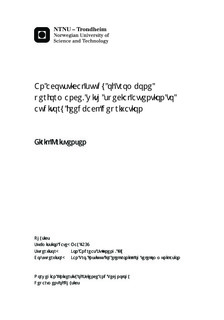An acoustical study of trombone performance, with special attention to auditory feedback deprivation
Abstract
When discussing how instruments work and how performers play them, the matter can be viewed from the standpoint of the musician or the scientist. In an attempt to bridge the gap between what science and musical experience know, acoustical methods are used to analyze trombone performance. The results provide a visual description of musical factors in trombone performance. Glissandi, sustained notes, transients, crescendos and decrescendos are studied through measurements of envelopes, spectra and spectral centroids for 9 players of different experience level. The analysis is done with the use of a Matlab toolbox for Music Information Retrieval (MIRtoolbox). The results shed light on previous studies on trombone performance, and give insight into the matter from a performance perspective. The discussion is focused on combining acoustic theory with musical expertise in order to better understand the full model of trombone performance. Further on, the effect of auditory feedback deprivation upon trombone performance is investigated. Eight trombonists, out of whom four were experienced professionals, and four amateurs, played musical pieces from notation and from memory. In addition, they performed a pitch-bending exercise (lipping). They did this under two playing conditions: A: With a masking noise of 95 dB on headphones, to completely remove auditory feedback from the instrument, and B: Without masking. Measurements of timing and RMS energy yielded statistically significant effects of auditory feedback deprivation on some amateur players, but not on professionals. The results indicate a correlation between musical experience and dependency on auditory feedback. A reason for this is suggested to be a more developed inner ear. It is also found that the effects of auditory feedback deprivation were greater for music performed from notation than music performed from memory. This is in agreement with Finney and Palmer (2003), who found that auditory feedback deprivation affects learning conditions, but not retrieval. Previous studies have concluded with no significant effects of auditory feedback deprivation upon keyboard performance (Gates and Bradshaw, 1974; Banton, 1995; Finney, 1997). In this study, observed tendencies towards disruption of performance in pitch bending exercises are found. Many players also failed to hit the correct resonant mode in the performance from notation, and some played out of tune. This suggests that auditory feedback deprivation has a more disturbing effect upon trombone performance than in the case of keyboard performance. A likely explanation for this result is that brass instruments provide the player with the possibility of producing several notes for one position or fingering, thus also the possibility of producing a wrong note. In lip-reed instruments, tuning and timbre are controlled by the player, which also introduces more room for disruption of performance. Slight differences on expressiveness in performance, tempo and dynamics were also observed, extending the findings of Repp (1999), who found small, but statistically significant results of auditory feedback deprivation upon expressive keyboard performance.
